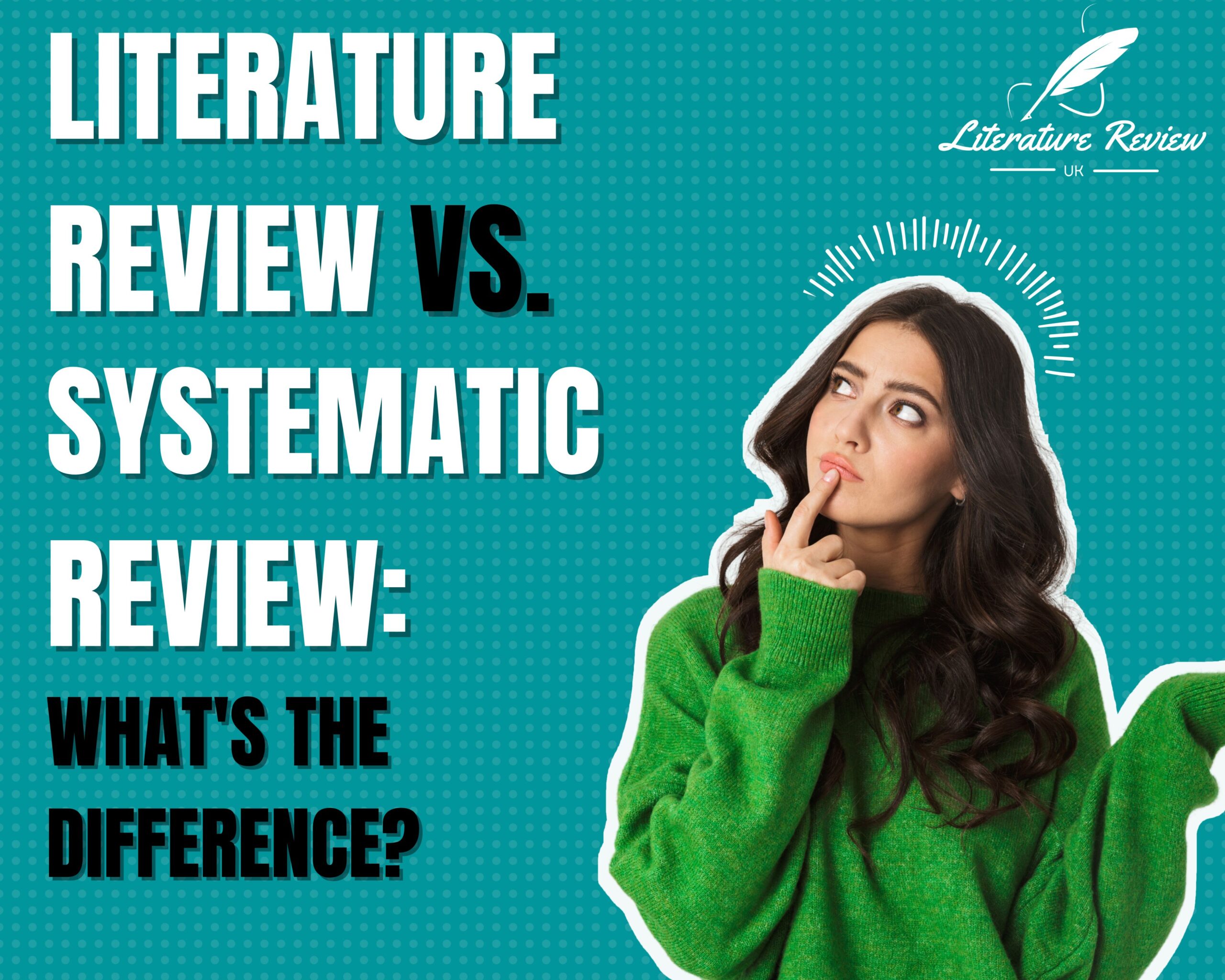
The terms “systematic review” and “literature review” are used interchangeably in the world of research. And if you are a student or a researcher, then you must be familiar with the terms. While both types of review aim to synthesise evidence and provide summary information there are some key differences. In this blog, we will explore those differences and help you determine which type of review is most appropriate for your research project.
Literature Review: Exploring Existing Knowledge and Research
A literature review is a comprehensive summary of existing knowledge on a topic. The literature review surveys scholarly articles, books and other relevant sources on a particular area of research. The review should provide an overview of the current knowledge in the field of study, allowing you to identify relevant theories, methods and gaps in the existing research that you can later utilise in your own paper, thesis or dissertation topic. A good literature review critically analyse, synthesises and evaluates sources to provide the reader with a clear picture of the state of knowledge available on the subject – it doesn’t just summarise the sources.
The Purpose of a Literature Review
While working on a research project, students and researchers are required to conduct a thorough literature review of the source to present their research within existing knowledge. By doing a literature review you get the chance to:
- Show that you are knowledgeable about the topic and its scholarly background.
- Develop a theoretical framework and research methodology for your research project
- Demonstrate the link of your work to other researchers and theorists
- Explain how your work will address a gap in the existing literature
- Analyse the research’s current state and show that you are knowledgeable about the scholarly discussions surrounding your chosen topic.
Steps to Conducting a Literature Review
There are five key steps to writing a literature review
- Step 1: Search for relevant literature
- Step 2: Evaluate sources
- Step 3: Identify themes, debates and gaps
- Step 4: Outline the structure
- Step 5: Write your literature review
Systematic Review: A Methodical Approach to Evaluating and Synthesising Evidence
A systematic review is a type of research study that aims to identify, appraise, and synthesise all available evidence on a particular research question. It involves a thorough search of relevant literature, critical appraisal of studies, and synthesis of findings. The goal is to provide a comprehensive and unbiased summary of the existing evidence on a particular topic.
Systematic reviews are often used to inform policy and practice decisions by providing rigorous and transparent evidence-based guidance. They can also be used to identify gaps in knowledge and areas where further research is needed.
The Purpose of a Systematic Review
The purpose of a systematic review is to provide a comprehensive and transparent summary of the existing evidence on a particular topic. This can be useful for a variety of reasons:
- To inform policy and practice decisions: Systematic reviews provide high-quality evidence that can inform policy and practice decisions. For example, a systematic review of the effectiveness of a particular intervention can help decision-makers determine whether to adopt or discontinue that intervention.
- To identify gaps in knowledge: Systematic reviews can help identify gaps in knowledge and areas where further research is needed. For example, a systematic review of the effectiveness of a particular treatment may identify areas where more research is needed to determine its optimal use.
- To improve research quality: Systematic reviews can help improve the quality of research by identifying methodological flaws and highlighting areas where more rigorous research is needed.
Steps to Conducting a Systematic Review
- Step 1: Define the research question
- Step 2: Conduct a comprehensive search
- Step 3: Screen studies for inclusion/exclusion
- Step 4: Assess study quality
- Step 5: Synthesise data
- Step 6: Interpret findings
Key Differences: Design, Methodology, and Analysis
Literature reviews and systematic reviews are the most common approaches used by researchers. Both aim to examine the existing literature on a particular topic, however, they have some key differences that distinguish them from each other. The differences lie in their design, methodology and analysis:
Design
Systematic reviews have a more rigorous design compared to literature reviews, systematic reviews are designed to be comprehensive, transparent and reproducible. They are conducted using a predetermined protocol that outlines the research question, inclusion and exclusion criteria and the search strategy. In contrast, literature reviews are often conducted without a clear plan on methodology and may be prone to bias.
Also, literature reviews are used to answer research questions that are broad and descriptive, while systematic reviews are more comprehensive and precise as they try to answer specific scientific research questions of high importance.
Methodology
The methodology used in literature reviews and systematic reviews also differs significantly. Literature reviews typically involve a less rigorous approach to literature search and selection. The search for relevant literature can be conducted using keyword searches in databases, and the selection of studies is often based on the relevance of the title or abstract. In contrast, systematic reviews require a more thorough and exhaustive search of all relevant literature sources. This includes not only electronic databases but also grey literature, conference proceedings, and unpublished studies.
Systematic reviews also employ a more rigorous process for study selection. Studies are screened based on a set of predetermined inclusion and exclusion criteria, and the quality of each study is assessed using standardised tools. This ensures that only high-quality studies are included in the review.
Analysis
The final key difference between systematic reviews and literature reviews lies in their analysis. Literature reviews often provide a descriptive summary of the existing literature on a topic. This includes identifying trends and patterns in the literature and highlighting gaps in the existing research. Literature reviews may also provide recommendations for future research based on the identified gaps
Systematic reviews, on the other hand, use a more rigorous and quantitative approach to analysis. Data from each study is extracted and synthesised, often using statistical methods. This allows for a more comprehensive and objective analysis of the existing literature. Systematic reviews may also include a meta-analysis, which is a statistical technique used to combine data from multiple studies to provide a more precise estimate of the effect of an intervention or exposure.
Choosing the Right Review Method
The type of review that is most appropriate for your research project will depend on a number of factors, including the research question, available resources, and desired outcomes. In general, a systematic review may be more appropriate when the research question is narrow and specific, and when a comprehensive synthesis of the evidence is required. A literature review may be more appropriate when the research question is broader and more exploratory, or when a more narrative approach to summarising the literature is desired.
Regardless of the type of review you choose, it’s important to carefully consider your research question, search strategy, and inclusion and exclusion criteria to ensure that you are capturing all relevant studies and producing high-quality, reliable results. By understanding the key differences between systematic reviews and literature reviews, you can make an informed decision about which method is best suited to your research needs.




